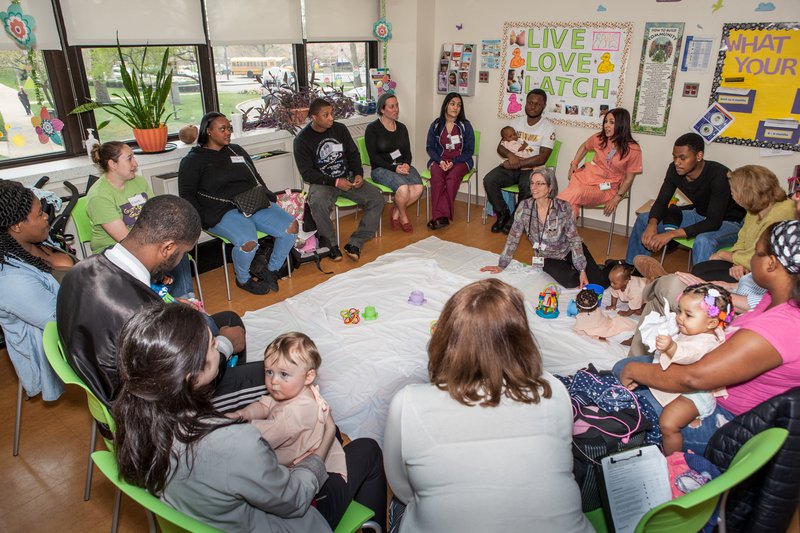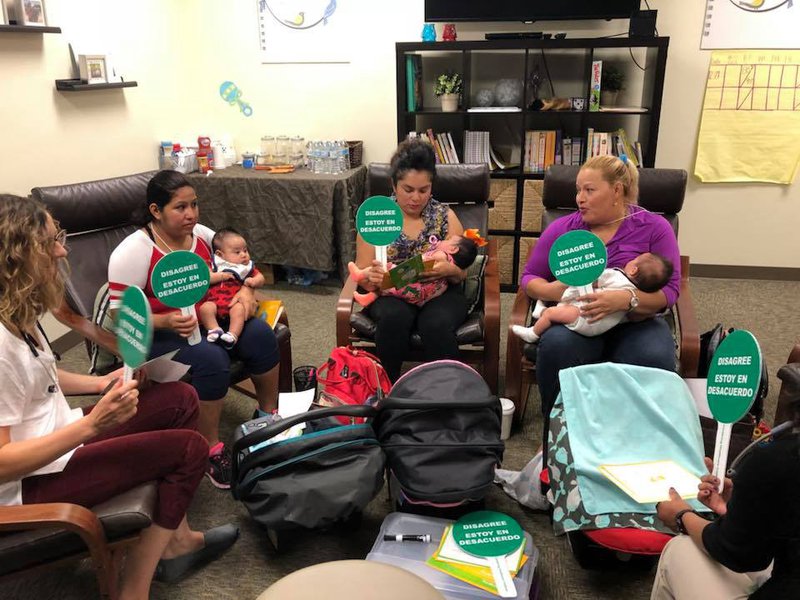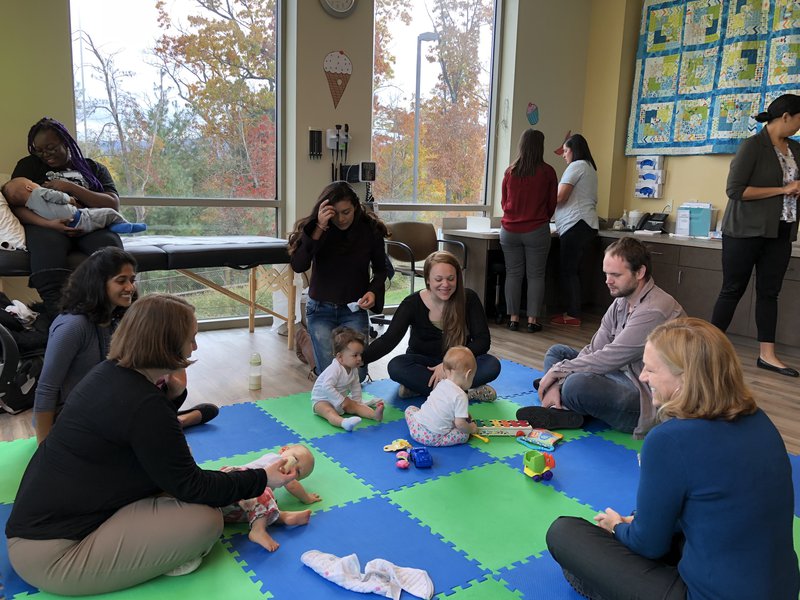Reducing Disparities in Birth Outcomes and Early Development

When we walked into Clinica Alta Vista, a health clinic for teenagers and young adults in Oakland, California, we met Marcela, a medical assistant, Parisa, a nurse practitioner, and Rosario, a social worker, who partner to support mothers and their new babies. We were there to join them as they led the clinic’s group care program for new mothers.
Today’s session had us spending time with the “Xena” group, including six mothers and their five-month-old babies who were due for their well-baby visits. After Marcela and Parisa gave developmental checks and vaccines, Marcela and Rosario facilitated games of Two Truths and a Lie and Memory to teach lessons on safe play and nutrition. Two hours later, the session ended with a three-breath mindfulness exercise. We walked away with the knowledge of which solid and liquid foods are appropriate for five-month-old babies, but more importantly we left with a deeper understanding of what it looks like when new mothers have access to extended quality time with their healthcare practitioners and with each other. Over 100,000 expecting and new parents have access to this type of healthcare every year thanks to the work of the Centering Healthcare Institute.
The Long Term Impact of Birth and Early Health Outcomes
The foundation for lifelong success is influenced by a variety of factors, many of which impact children long before they enter kindergarten. We know that cognitive, physical, and social-emotional development are all critical elements of a child’s school and life readiness. However, we don’t always make the connection back to the key health outcomes and behaviors from the prenatal period through the first two years of life that impact this early development. Negative experiences in these critical early years can affect kindergarten readiness, and ultimately lifelong success. For example:
- About 1 in 10 infants is born preterm. This impacts vital brain development, leading to poorer scores on cognitive assessments at ages three and five, and decreased social-emotional functions at preschool age and beyond.
- 1 in 6 American children experience developmental delays or disabilities. Yet, only one-third of children ages zero to three receives recommended developmental screenings (a process that is often integrated into a pediatric visit). Not surprisingly, only 30 percent of developmental delays are detected before kindergarten.
- Many children’s diets fall short of recommended dietary standards, with only 2 percent of children meeting the USDA Food Guide pyramid recommendations; about 1 in 7 children ages two to five are overweight.
- These outcomes are exacerbated by socioeconomic status and race. Black women experience 50 percent higher preterm birth rates as compared to white women, even when controlling for socioeconomic status. Compared to the highest-income families, the lowest-income families are less likely to have developmental screenings and have higher rates of growth stunting and nutrition disorders.
We know that cognitive, physical, and social-emotional development are all critical elements of a child’s school and life readiness. However, we don’t always make the connection back to the key health outcomes and behaviors.
At Omidyar Network, we are committed to reaching young children and families across settings, from homes to preschools. When it comes to addressing critical early childhood outcomes, prenatal and pediatric visits are the only setting that reaches nearly every mother and child, birth to three. There are many early childhood programs and interventions that operate in healthcare settings, but few have the evidence base, emerging scale, and financial sustainability to reach hundreds of thousands, and potentially millions, of families across the country. Even fewer leverage the power of human connection and peer support.
With all of those considerations in mind, we are thrilled to support The Centering Healthcare Institute (CHI), a national nonprofit organization that utilizes a proprietary group care model in both obstetric and pediatric visits. Founded in 1993 by Sharon Schindler Rising, a nurse midwife, Centering’s programs have demonstrated a powerful ability to decrease health disparities for both the mother and the child and spark parental behavior change.

Pioneering A New Model: Group Prenatal and Pediatric Care
Today, a typical experience for an expecting mother may involve waiting 20 minutes to see her physician for a 15-minute appointment. In CenteringPregnancy, instead of seeing the OB/GYN alone, a group of eight to 12 women with due dates around the same time meet with the doctor together over the course of two hours. They receive the standard healthcare during their group session, which is just a combination of the individual, billable visits, and they also share expectations and experiences with pregnancy and preparing for parenthood. They learn together to help their babies thrive. The CenteringPregnancy experience builds trust between expecting mothers and clinicians and promotes patient ownership of the healthcare experience. And the results show that it works, including a 33–47 percent lower risk of having a preterm birth and a 28 percent lower risk of NICU stay.
But Centering doesn’t stop there. As of 12 years ago, this group of parents, including dads, started to have the opportunity to grow and learn together for the first two years of their children’s lives. In CenteringParenting, the group care model transitions to the pediatrician’s office, where together, parents and babies spend two hours with their pediatricians while receiving standard well-baby healthcare, developmental screenings for the child, and maternal healthcare for the new mother. This all happens while the Centering group learns together about key aspects of positive parenting, from serve and return interactions to nutrition. This group of parents, who are experiencing similar challenges along the same timeline, build relationships and thrive thanks to peer support. Similarly to CenteringPregnancy, the outcomes of CenteringPregnancy speak for themselves: 97 percent of infants are immunized; 78 percent continue to be breastfed at six months; 85 percent receive developmental screening by age three; and 91 percent of the new mothers have received postpartum depression screening.
What makes Centering especially unique is the focus on health equity. While Centering practices are used in all types of healthcare settings and with patients across all socioeconomic statuses, the national organization intentionally targets expansion in low-resource communities, and many of its patients are in communities of significant need. 68 percent of Centering patients are either on Medicaid or uninsured, and 34 percent and 31 percent of Centering patients are black and latinx, respectively. Centering can have the greatest impact on these patients because the practice has demonstrated the ability to reduce the racial disparities in health outcomes.

Transcending the Worlds of Healthcare and Education
For quality early childhood development, healthcare and education settings offer the best opportunities to support new families. Yet, the healthcare and education sectors often operate in silos, even though the importance of the connection between the two is widely known. With rising public awareness on maternal health, and particularly the racial disparities in birth outcomes for mothers and babies, that focus is starting to shift. New technology solutions such as Genius Plaza (through Genius Village), Maven, and Mahmee are finding ways to better connect a woman and her new baby’s healthcare with the child’s early development, and early childhood education programs like The Primary School and The Lourie Center feature health supports in tandem with academic and socio-emotional development. The positive health outcomes that Centering delivers coupled with their support for parents to better understand their baby’s early brain development sets the foundation for success later in life, including educational success.
Today, Centering programs operate in nearly 600 practice sites within communities in 44 states , in settings that include Federally Qualified Health Centers, community and hospital clinics, academic medical settings, private practice, US military, and the Indian Health Service. We are excited to support Centering as they continue expansion nationwide, and look forward to watching the Centering model shift the way we think about the future of prenatal and pediatric care, so that many more families can experience the attention and care that we saw Marcela, Parisa, and Rosario providing the Xena group at Clinica Alta Vista.